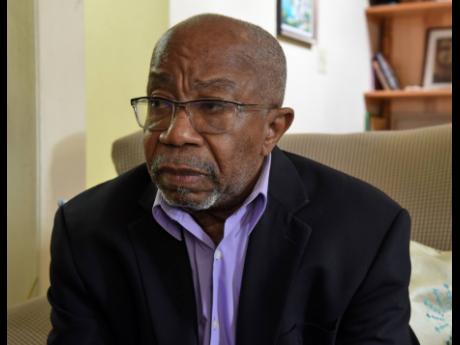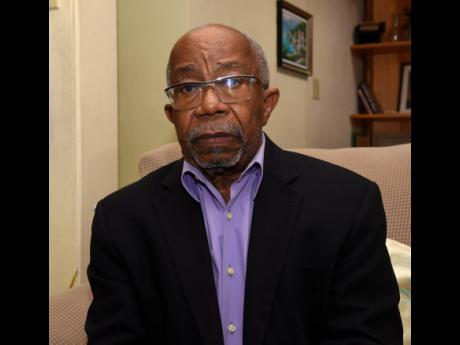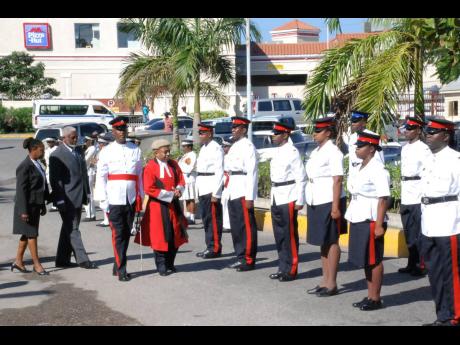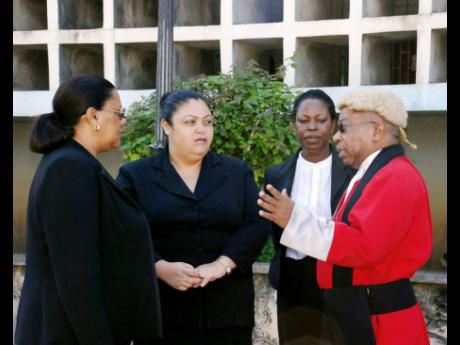‘We must restore confidence in the justice system’
Retired Judge Lennox Campbell calls for return to civic pride
Retired Supreme Court Judge Lennox Campbell is aware that Jamaica’s justice system needs significant improvements, but he asserts that the citizens must take an active role in order for it to properly function.
He is calling on Jamaicans to do their part by coming forward to serve as jurors and to assist the police in criminal investigations. The input of the public is democracy in action, which is not reserved for the Government or any special sector in the society, he said last week.
Campbell believes that the citizens’ failure to serve is indicative of a lack of civic pride. And as the island celebrates 60 years of Independence, he is making a plea for the Government to reintroduce civics in schools to give children a well-needed foundation to contribute to society.
“The proper functioning of a justice system requires the input of the ordinary Jamaicans; that is what I consider fundamental and essential. Now, the question is: to what extent is the Jamaican citizenry engaged in the system and in the administration of justice?” Campbell reasoned with The Sunday Gleaner.
“The fact that the Constitution makes peace, order and good government the primary essential objective of the Executive arm means that body alone is seized with that function. My view is that it extends wider than that and reasonable steps ought to be taken to ensure that the citizenry are encouraged to participate in the administration of justice.”
He continued, “When one looks at the Jamaican situation, for years, the system has been failing. For persons who are familiar with the workings of the courts, you start with the jury system, which has been failing. Chief Justice Bryan Sykes has called for an end to trial by jury, which, to my mind, is a devastating thing to the democracy, to the country, and what the rule of law stands for because the right to trial by your peers is an invaluable right that ought not to be very easily dispensed with or be dispensed with at all.
“But I acknowledge that the chief justice and some lawyers were led to this point, that the jury system is a hindrance, because too often trial dates after trial dates, matters are unable to proceed because of insufficiency of jurors.”
LIFE OF SERVICE
With almost 50 years in the legal profession, Justice Campbell dedicated his life in service to his country ever since graduating from the Norman Manley Law School in 1975, earning him an induction into the Order of Distinction (Commander Class) in 2016.
He is one of the few lawyers who have the distinction of working in both the Attorney General’s Chambers, where he was appointed deputy solicitor general and director of the commercial law and litigation division, and the Office of the Director of Public Prosecutions, where he was the assistant director of public prosecutions.
Campbell was later appointed a parish judge, and in May 2000, he was appointed to the Supreme Court Bench, serving there until his retirement in 2017. Following his retirement, he was appointed a Judge of the Court of Appeal in Belize.
While at the Attorney General’s Chambers, he was appointed Queen’s Counsel and was responsible for negotiations with the World Bank on behalf of the Government of Jamaica as well as the privatisation of the energy sector.
During his time at the Bench, Justice Campbell oversaw a number of high-profile cases, sometimes making controversial rulings.
He recalls a decision he made in a case in the Home Circuit that caused an uproar in both legal and judicial circles. The ruling was also publicly criticised and ridiculed.
“This particular matter had multiple accused who were charged with the murder of a policeman. They had been coming to court for 15 years and still had not been tried. The primary reason why the matter had not been tried was because the court was unable to obtain a sufficiency of jurors,” he said.
The retired judge said that on examining the situation, he asked the prosecutors and defence lawyers if they didn’t think 15 years of pre-trial delay was unconstitutional and they could not respond.
The accused men were on bail and the matter was adjourned without a date being set for them to return to court. The prosecution was advised that it could bring the matter back when it was in a position to proceed with the trial.
The case has not been brought back before the court and Justice Campbell said he wrote a judgment outlining the reasons for his decision because the long delay was a clear breach of the men’s constitutional right to trial within a reasonable time.
“The position I took was supported by the legal authorities I examined,” he said.
He said Chief Justice Sykes, who was then a puisne judge, was one of the few persons who agreed with the decision.
COURT BACKLOG, TRAFIGURA AFFAIR
Turning to the huge backlog of cases in the criminal and civil courts, Justice Campbell told The Sunday Gleaner that it will require additional judicial resources, including judges and clerks, as well as other facilities to expedite the work of the courts. But given its urgency, an immediate plan of action is needed.
“But there is a need for more judges in Jamaica, given the volume of work to be done,” he said, judging especially from what he has seen in the other territories in which he has worked.
As it relates to the reluctance of witnesses to attend court and citizens being afraid to assist the police with information, Justice Campbell is cognisant that fear and the “informer fi dead” culture were an impediment.
“We must restore confidence in the administration of justice. We need to let the witnesses know that we will protect you when you come to court, and we need to be in a position to do so. Delay, in some quarters, is viewed as being beneficial to the defence because of the consequences it has on the witnesses,” he shared.
Justice Campbell recounts the verbal abuse and criticism he faced when he was tasked to make a ruling as to whether the high-interest Trafigura matter involving senior People’s National Party (PNP) officials should be heard in the open court. The Dutch authorities wanted to question PNP functionaries in relation to a $31-million donation in 2006 by the Dutch oil trading company Trafigura Beheer to the party.
“The invectives and comments that were aimed at the court were, without doubt, the most painful that I had endured throughout my judicial career,” he disclosed.
After hearing legal arguments, Justice Campbell ruled in 2011 that it must be held in open court. The ruling was appealed, but the Court of Appeal and the United Kingdom Privy Council – Jamaica’s final appellate court – upheld the ruling.
The hearing was held in open court this year.
“A judge must be firm, must stand by your conviction and know that you are part of the Constitution and cannot be beholden to anyone. So do your job without fear or favour,” the Kingston College old boy advised.
“As a graduate of the Norman Manley Law School, I share a special bond with members of my graduating class of 1975. We were the first batch of West Indian-trained attorneys and that class produced some of the finest legal minds in our jurisdiction.”
Justice Campbell said he will be forever grateful to the ordinary Jamaicans, who, through governmental policy, funded his tertiary education.
“My parents, hard-working and industrious as they were, would have been unable to meet the economic cost for my education,” he said last week.
And looking back at his career, he has no regrets.
“I have absolutely no regrets in relation to my posture on legal issues that were posed. I was never interested in being popular; my aim was always to be guided by the law and to follow the law wherever it took me.”
Justice Campbell advises: “To young attorneys entering the profession at this time, I implore you to remember the ideals that you embrace in choosing this noble profession. Your training will allow you to participate in the administration of your country at all levels and from that you should never shy.”




